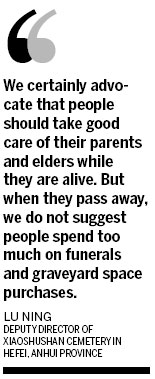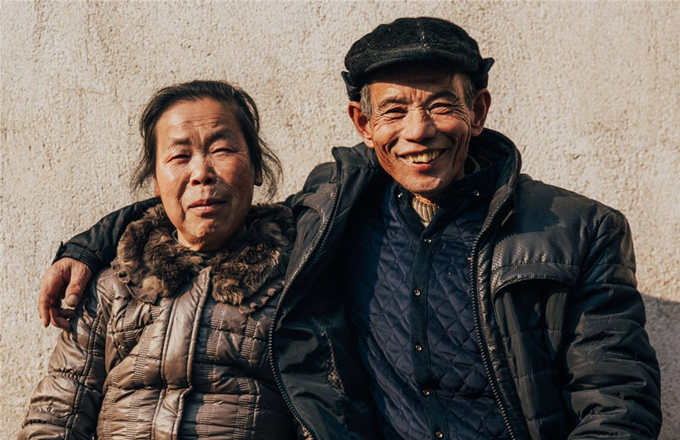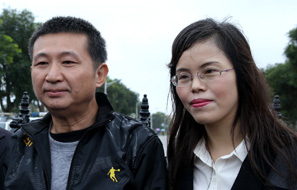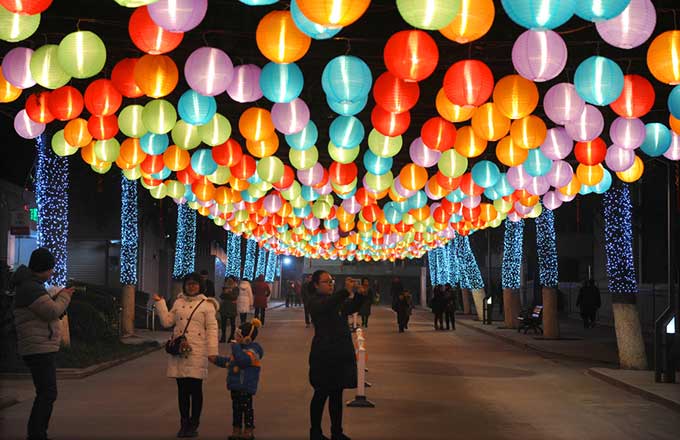Authorities encourage people to choose ecological burial
Ecological burial services are gaining popularity across China, as the authorities try to ease the severe shortage of cemetery space.
Civil affairs bureaus and cemeteries in many cities are providing subsidies to encourage people to purchase ecological burial services, in the run-up to Tomb-sweeping Day, the traditional Chinese festival to visit cemeteries and offer sacrifices to ancestors, which falls on April 4 this year.
|
 |
Lu Ning, deputy director of Xiaoshushan Cemetery in Hefei, the capital of Anhui province, said 24 households have arranged services on Saturday morning to bury family members' ashes under trees, a patch of grass or in flowers, instead of in traditional graves.
Since the cemetery started to provide such burials under trees in 1999, about 1,000 households have so far accepted the ecological alternative - still a small number, said Lu, compared to the more than 1,000 people buried in traditional graves at the cemetery each year.
Xiaoshushan cemetery is the biggest in the province, with more than 40,000 tombs.
A burial under trees costs 990 yuan ($159) a person, and the fees are waived for those living under the poverty line. The cost of a traditional graveyard burial starts at 2,000 yuan, she said.
Despite the obvious price difference, most people prefer traditional burials, however, because they fear being looked down upon by neighbors for their stinginess, he added.
Chinese still want to show their filial piety, a virtue of respect for parents and ancestors, through expensive funerals and grave accessories, Lu said.
"We certainly advocate that people should take good care of their parents and elders while they are alive. But when they pass away, we do not suggest people spend too much on funerals and graveyard space purchases," she said.
But despite Chinese being slow to accept ecological burials, it is a growing market, even among high-end customers, say experts.
Jin Xin, a veteran soldier from Henan province, runs a sea burial business in the coastal city of Sanya, Hainan province.
He charters cruise ships and can charge tens of thousands of yuan for a three-hour round trip to scatter ashes.
Jin has received customers from Qinghai province and the Xinjiang Uygur autonomous region.
A couple from Qinghai paid more than 30,000 yuan to scatter their son's ashes near a 108-meter-high statue of the Bodhisattva at sea.
Their son had been to Sanya and enjoyed the city. His parents found a good place for him to rest and received blessings before the ceremony
Several coastal cities including Shanghai, Shenzhen, Qingdao and Tianjin, have similar services, Jin said.
"So far demand is far from stable, but I believe many people can afford the service and like the idea, and so I am afraid of competition in the future," he said.
Many provinces in China say they are likely to run out of cemetery space within 10 years, if no new cemeteries are built, as about 8 million people die every year - a number that is still growing in an aging society, said a report sponsored by the Ministry of Civil Affairs.
The ministry's 101 Institute, a organization specializing in funeral services research, released a report on Thursday showing graveyard shortages are already hitting cities like Beijing, Shanghai and Guangzhou.
In the capital, only 31.3 percent of the 85,705 who died in 2010 were buried in official cemeteries.
In Guangdong province, only 5.9 percent of those who died in 2010 were buried in such cemeteries, the report said.
In Shanghai, 80 percent of the land allotted as burial ground has already been used up, and the rest will be used in the next six to seven years, the report said.
Wang Qi, director of the funeral management department at the civil affairs bureau in Beijing, acknowledged the limited supply of land.
He said Beijing cremates about 87,000 bodies a year, but burial within a cemetery is only one option. In some cases, the ashes were taken to the deceased person's hometown.
liyao@chinadaily.com.cn



















